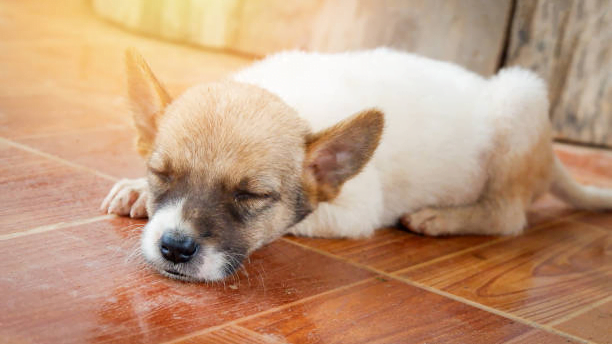Dog Diarrhea: Causes, Treatment, and Prevention
Dog diarrhea is a condition that affects dogs and can be acute or chronic, can last for a short time or long time, and will have an impact on the body of the animal in question. Knowing the causes of, signs of, and ways to manage and/or prevent diarrhea in your dog is valuable to your dog’s well-being.
Causes of Dog Diarrhea

The nature of diarrhea can be, in some cases as simple as a change in diet, while other severe causes include bacterial infections. Below are the common causes:
Dietary Indiscretion
Dogs often eat things they shouldn’t, such as spoiled food, garbage, or non-food items like grass, dirt, or foreign objects, leading to gastrointestinal upset.
Sudden Change in Diet
Diet changes in dogs also cause problems and this might force the dog into defecating often or have diarrhea. Apart from that when changing to new food it should be done gradually within 3-4 days.
Food Allergies or Intolerance
In addition, certain dogs may suffer from loose stool because they have developed an allergy or intolerance to some of the foods that are included in their diet including wheat, soy, or any given protein.
Infections (Bacterial, Viral, or Parasitic)
Bacterial infections for instance Salmonella, viral infections including parvovirus, and parasites like roundworms and giardia can cause diarrhea in dogs.
Medications
Some kinds of drugs for example antibiotics are known to affect the balance of bacteria in the digestive system of dogs leading to diarrhea.
Stress or Anxiety
Stress which may be caused by factors such as a change of environment, alteration of daily activities, travel stress, etc., causes diarrhea. Dogs are good animals and capable of reacting to the emotional state of any individual. This is the reason why their digestion is affected.
Medical Conditions
Other conditions that may lead to diarrhea include IBD, pancreatic insufficiency, liver or kidney disease, as well as cancer.
Symptoms Associated with Dog Diarrhea

While diarrhea is the most obvious symptom, there are other signs that may accompany it, indicating a more serious issue: While diarrhea is the most obvious symptom, there are other signs that may accompany it, indicating a more serious issue:
Vomiting
If your dog is vomiting and has diarrhea at the same time this may mean you are dealing with something more serious.
Lethargy
If a dog has diarrhea and is more tired or weak than usual or less active than he used to be, he could be dehydrated or infected.
Abdominal Pain
Some of the warning signals are whining, hunching, and the dog avoiding movement or demonstrating reluctance to it.
Fever
Fever also comes hand in hand with diarrhea and this can be as a result of infection or inflammation.
Bloody Stool
Blood in diarrhea, whether bright red or tarry black, is a warning sign of a more serious condition that requires veterinary attention.
Weight Loss
The steady loss of weight can be attributed to chronic diarrhea, especially in cases that are due to other illnesses.
Diagnosis of Dog Diarrhea
Diarrhea in dogs may be just a symptom of a larger problem, therefore the vet will do some examinations to find the reason. Common diagnostic tests include:
Fecal Exam
To look for parasites or the presence of any abnormal bacteria in a given sample.
Blood Work
To monitor the state of organs, as well as to exclude the presence of diseases and infections.
X-rays or Ultrasounds
As part of the gastrointestinal examination, to ensure that there are no foreign bodies, tumors, or any anatomical changes within the GIT.
Endoscopy
On some occasions, a veterinarian may suggest that endoscopy be used to inspect the stomach and the intestines actual.
Treatment for Dog Diarrhea
Treatment for dog diarrhea depends on its underlying cause. Below are the common approaches:
- Fasting
Short-term fasting, for around 12-24 hours, can help give the digestive system a rest and may help resolve diarrhea. - Hydration
Keeping your dog hydrated is essential during diarrhea episodes. Ensure access to clean water, and consider electrolyte solutions if recommended by a vet. - Bland Diet
Once the fasting period is over, introducing a bland diet consisting of boiled chicken (without skin or bones) and rice can help calm the digestive system. - Probiotics
Probiotics can help restore the balance of good bacteria in the gut, improving digestion and reducing diarrhea. - Medications
Depending on the cause, your vet may prescribe antidiarrheal medications, antibiotics, or anti-parasitic treatments. - Veterinary Intervention for Severe Cases
In cases where diarrhea is persistent, bloody, or accompanied by other severe symptoms, veterinary intervention is crucial. Intravenous fluids, hospitalization, or surgery might be necessary depending on the diagnosis.
Preventing Dog Diarrhea
Prevention is key to avoiding future episodes of diarrhea in dogs. Here are some tips to maintain your dog’s digestive health:
- Feed a Consistent, Balanced Diet
Stick to high-quality dog food and avoid giving your dog table scraps, which can lead to stomach upset. - Gradual Diet Changes
If changing your dog’s food, do so gradually by mixing small amounts of new food with their current diet over the course of a week. - Regular Parasite Control
Keep your dog on a regular deworming schedule and use flea and tick preventatives to minimize the risk of parasites. - Limit Access to Garbage and Non-food Items
Ensure your dog does not have access to garbage or any foreign objects that they might ingest. - Manage Stress
Help your dog manage stress by maintaining a consistent routine and providing a calming environment.
Home Remedies for Dog Diarrhea
For mild cases of diarrhea, you can try home remedies before consulting a vet:
| Home Remedy | Details |
|---|---|
| Fasting | Rest the digestive system for 12-24 hours. |
| Bland Diet (Chicken & Rice) | Feed small portions to soothe the stomach. |
| Pumpkin | Pureed, unsweetened pumpkin can help firm up stools. |
| Probiotic Supplements | Help balance gut bacteria and aid digestion. |
| Electrolyte Solution | Ensure proper hydration, especially after diarrhea episodes. |
When to See a Vet
While mild cases of diarrhea often resolve with home care, consult a vet if:
- Diarrhea lasts more than 48 hours.
- Your dog shows signs of severe dehydration (dry gums, lethargy).
- There is blood in the stool.
- Your dog has a fever, vomits, or is in pain.
- Your dog is a puppy, senior, or has a pre-existing health condition.
Frequently Asked Questions (FAQs)
1. How long does dog diarrhea typically last?
Mild cases of diarrhea usually last between 24 and 48 hours. If diarrhea persists beyond this period, or if it is accompanied by other symptoms, consult a vet for a thorough evaluation.
2. Can I give my dog human medications for diarrhea?
It is not recommended to give your dog over-the-counter human medications without consulting a vet. Some human medications can be harmful or toxic to dogs.
3. Is it normal for my dog to have diarrhea after switching food?
Yes, a sudden change in diet can cause diarrhea. Always transition to new food gradually over 7-10 days by mixing small amounts of the new food with the old food, slowly increasing the ratio over time.

